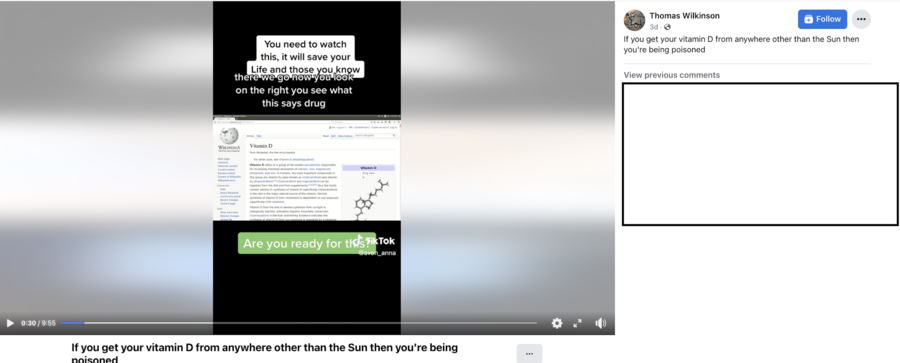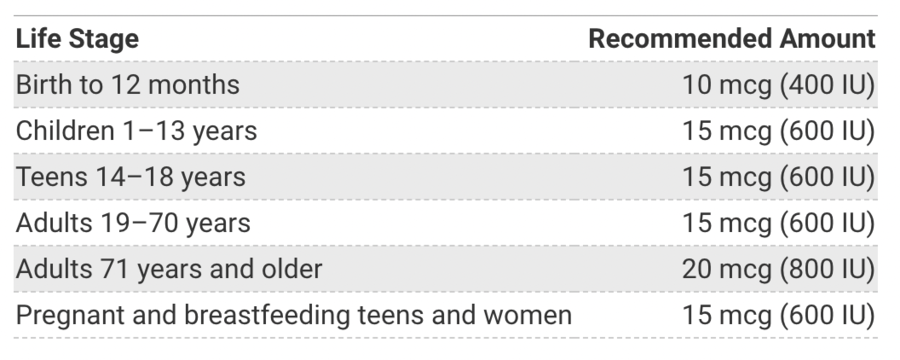
Does getting vitamin D "from anywhere other than the Sun" poison people? No, that's not true: A video on social media misrepresents the properties of vitamin D.
The claim appeared in a clip published on Facebook on April 4, 2023, under the title:
If you get your vitamin D from anywhere other than the Sun then you're being poisoned
This is what it looked like at the time of the writing of this fact check:
(Source: Facebook screenshot taken on Fri Apr 7 19:36:15 2023 UTC)
In the video, the male narrator goes to Wikipedia to find out "what vitamin D really is." He looks at the chemical formula of vitamin D3, also known as cholecalciferol, follows the link to the page about it and highlights a section saying "used as rodenticide."
At the 1:04 mark, the man says:
Used as a rodenticide. Do you know what it means? It's a rat poison. Don't believe me? Click on it!
At the 2:21 mark, he continues:
They are drugging the milk with rat poison. It's called cholecalciferol, and they're calling it a vitamin, vitamin D.
However, the video is misleading.
The Office of Dietary Supplements at the U.S. Department of Health and Human Services defines vitamin D as a vitamin, not a poison, and says its deficiency may cause "rickets in infants and children and osteomalacia in adults."
The Harvard T.H. Chan School of Public Health website summarizes the functions of vitamin D:
It is a fat-soluble vitamin that has long been known to help the body absorb and retain calcium and phosphorus; both are critical for building bone. Also, laboratory studies show that vitamin D can reduce cancer cell growth, help control infections and reduce inflammation.
While the human body can produce some vitamin D as a result of exposure to sunlight, it may not be enough. But spending more time in the sun to combat its deficiency, as the post suggests, may be dangerous.
In an article published on the website of the clinical practice for the Yale School of Medicine, Dr. David J. Leffell, a dermatologist and dermatological surgeon who treats patients with melanomas, described misinformation about vitamin D as "one of the biggest challenges" in his field:
There are claims that one needs to get a certain amount of sun exposure every day in order to produce enough vitamin D to be healthy. It's just not true. The majority of people can get their vitamin D from nutritional supplements and from vitamin D-fortified foods.
Jessica Bihuniak, an assistant professor of clinical nutrition at New York University, told Lead Stories via email on April 7, 2023:
Sun exposure is not appropriate for all individuals. For example, if someone has a history of skin cancer they are advised to reduce their sun exposure. Additionally, people who wear long robes, dresses, or head coverings for religious reasons; and people with occupations that limit sun exposure are among the groups that are unlikely to obtain adequate amounts of vitamin D from sunlight.
Bihuniak also pointed to the 2020-2025 Dietary Guidelines for Americans, prepared by the federal government, which says:
Because foods provide an array of nutrients and other components that have benefits for health, nutritional needs should be met primarily through foods. ... In some cases, fortified foods and dietary supplements are useful when it is not possible otherwise to meet needs for one or more nutrients (e.g., during specific life stages such as pregnancy).
Just like many other elements in excessive amounts, vitamin D may be harmful, too, but that does not mean any dose of it is poisonous. The Office of Dietary Supplements provides guidelines, based on a person's age:
(Source: NIH screenshot taken on Fri Apr 7 18:13:10 2023 UTC)
The National Pesticide Information Center, maintained by Oregon State University in cooperation with the U.S. Environmental Protection Agency, explains why vitamin D3 works against rodents, but points out that people are unlikely to get poisoned by it:
Vitamin D helps the body maintain calcium balance by enhancing absorption of calcium from the gut and kidneys. Toxic doses of cholecalciferol lead to too much calcium in the blood, which can affect the central nervous system, muscles, the gastrointestinal tract, cardiovascular system, and the kidneys. The body's ability to maintain proper calcium levels must be overwhelmed before cholecalciferol becomes toxic. Rodents must eat several doses of this rodenticide. This causes a time lag between exposure and signs of toxicity. Although pets have gotten sick from eating cholecalciferol, poisonings of people are very rare.
Replying to Lead Stories via email on April 7, 2023, the National Pesticide Information Center elaborated:
As with any substance, the dose makes the poison, and the dose does relate to weight of the animal. You will often see dosing information measured in mg/kg. This refers to milligrams (mg) of a substance ingested per kilogram (kg) of body weight of the animal. A one-pound rat would need to eat much less of the substance than a 150-pound human to reach a toxic dose and experience harm.
The Mayo Clinic website also says that hypervitaminosis D is rare: In humans, the dosage causing toxicity has to be 100 times higher than the recommended amount, and that has to be consumed for a prolonged period of time, but even these concentrations tend to be reversible.
Other Lead Stories fact checks of claims about vitamin D can be found here, here and here.



















